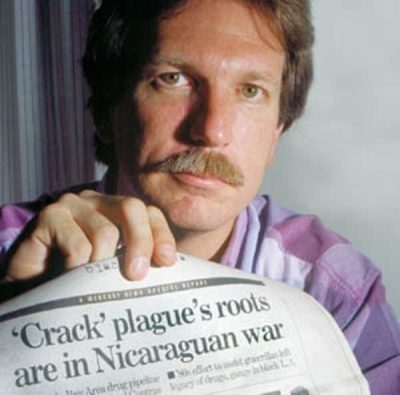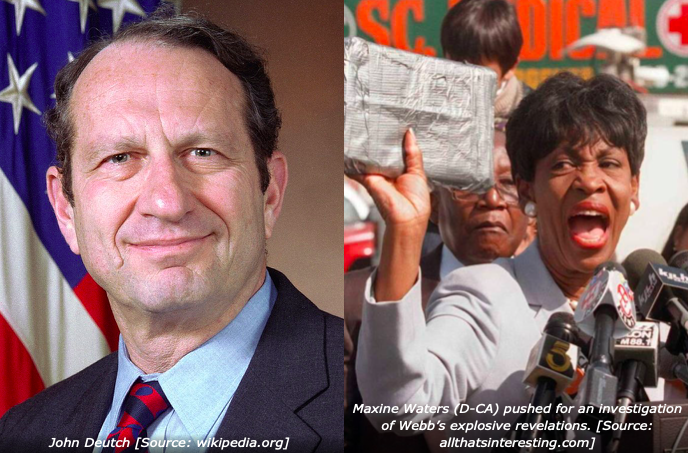Eighteen Years Ago: Journalist Gary Webb Was Murdered After Exposing CIA Drug Trafficking

All Global Research articles can be read in 51 languages by activating the Translate Website button below the author’s name.
To receive Global Research’s Daily Newsletter (selected articles), click here.
Follow us on Instagram and Twitter and subscribe to our Telegram Channel. Feel free to repost and share widely Global Research articles.
***
On December 10, 2004, the body of journalist Gary Webb, 49, was discovered in his home near Sacramento after a moving company worker found a note posted to his front door that read: “Please do not enter. Call 911 and ask for an ambulance.”
Webb’s death was listed as a suicide, but Webb was found with two bullet holes in the head, indicating that he was executed.[1]
In the days leading up to his death, Webb had told friends that he was receiving death threats, being regularly followed by what he thought were government agents, and that he was concerned about strange individuals who were seen breaking into and leaving his house.
In the late 1990s, Webb had written a series of stories for the San José Mercury News, which provided the basis for his book, Dark Alliance: The CIA, the Contras, and the Crack Cocaine Explosion (New York: Seven Stories Press, 1998).
In it, Webb detailed how the explosion of crack cocaine in South Central Los Angeles during the 1980s was sparked by two Nicaraguan émigrés, Danilo Blandón and Norwin Meneses, who sold huge amounts of cocaine to raise funds for a CIA-backed rebel army—the Contras.
Webb was a Pulitzer Prize winner whose “Dark Alliance” series went viral in the early days of the internet. It caused a firestorm that led to the resignation of CIA Director John Deutch after he was grilled by angry Black activists at a meeting in L.A.[2]
Webb’s story had traced how cocaine was shipped into San Francisco and distributed in L.A. after Blandón and Meneses sold it to a street dealer from South Central named “Freeway” Ricky Ross.
Through this connection, “Freeway Rick” became a crack kingpin, using his contacts with L.A.’s Crips and Blood street gangs to help distribute crack to many other cities across the country.
Webb had first heard about the story after receiving a tip from the girlfriend of a drug dealer against whom Blandón was testifying.
In his lead paragraph, Webb wrote that “a Bay Area drug ring had funneled millions in drug profits to a Latin American guerrilla army run by the U.S. Central Intelligence Agency” which was in league with “Uzi-toting ‘gangstas’ of Compton and South-Central L.A.”
The thrust of Webb’s research was confirmed in 1998 when a CIA inspector general’s report acknowledged that the CIA had worked with suspected drugrunners while supporting the Contras in Nicaragua.[3]
The corruption Webb exposed led all the way to the White House and President Reagan via his aide, Lieutenant Colonel Oliver North, who was coordinating, under Reagan’s orders, the illegal supplying to the Contras of weapons that were purchased with profits from the cocaine being smuggled into the U.S. and distributed around the country by criminals in league with the CIA.
Because of the far-reaching implications, Webb became the target of what Alexander Cockburn and Jeffrey St. Clair called “one of the most venomous and factually inane assaults on a professional journalist’s competence in living memory.”
The assault was spearheaded by the CIA in collaboration with the major agenda-setting media like The New York Times, The Washington Post and Los Angeles Times—which put some 17 reporters on the assignment to destroy Webb.[4]
The Mercury News’s top editor, Jerry Ceppos, ultimately buckled, and threw Webb to the wolves, deleting the website and penning a letter of apology to the readers for the “Dark Alliance” series.[5]
Webb was in turn banished to a small Mercury News bureau in Cupertino, California, south of San Francisco—125 miles from his home and family in Sacramento—and forced to write stories normally assigned to cub reporters. His career was effectively destroyed and he would never again get a job with a daily newspaper.
Webb stood by his research, nevertheless, and continued to expose corruption as a freelance journalist. His final publication unearthed the strategic use of video games by the Pentagon as a method of indoctrination and recruitment of teenage boys.
In a tribute to Webb, Robert Parry, the founder of Consortium News, wrote that Webb’s death marked “an exclamation point” on a “sorry era of journalism that began with the rise of Ronald Reagan and saw the gradual retreat—under right-wing fire—of what had once been Washington’s Watergate/Pentagon Papers watchdog press corps.”
Since these words were written, things have only gotten worse, with the media helping to advance the Russia Gate conspiracy theory while promoting scurrilous allegations against Russia that have helped mobilize public support for the war in Ukraine.
All the more reason to honor Webb and the uncompromising journalistic integrity that he stood for.
*
Note to readers: Please click the share buttons above. Follow us on Instagram and Twitter and subscribe to our Telegram Channel. Feel free to repost and share widely Global Research articles.
Jeremy Kuzmarov is Managing Editor of CovertAction Magazine. He is the author of four books on U.S. foreign policy, including Obama’s Unending Wars (Clarity Press, 2019) and The Russians Are Coming, Again, with John Marciano (Monthly Review Press, 2018). He can be reached at: [email protected].
Notes
-
Webb’s friends said that there is no way he would have taken his own life: He loved life and loved his kids. His cause of death was changed to “single gunshot wound” when people began to question how or why a man would shoot himself in the face twice. This represented a concentrated effort to cover up the nature of Webb’s death. After Webb died, he was immediately cremated thereby destroying forensic evidence of the gunshot wounds.
- Webb’s book was endorsed by Congresswoman Maxine Waters (D-CA) who said that “the time I spent investigating the allegations of the Dark Alliance series led me to the undeniable conclusion that the CIA, DEA, DIA and FBI knew about drug trafficking in South Central Los Angeles. They were either part of the trafficking or turned a blind eye to it, in an effort to fund the contra war. . . . This book is the final chapter on this sordid tale and brings to light one of the worst official abuses in our nation’s history.”
- Associated Press journalists Robert Parry and Brian Barger had earlier reported that Contra groups had “engaged in cocaine trafficking, in part to help finance their war against Nicaragua.”
- Alexander Cockburn wrote at CounterPunch that “squadrons of hacks, some of them with career-long ties to the CIA, sprayed thousands of words of vitriol over Webb and his paper, the San Jose Mercury News, for besmirching the Agency’s fine name by charging it with complicity in the importing of cocaine into the U.S.” NBC’s Andrea Mitchell characteristically branded Webb’s story as a “conspiracy theory.”
-
Ceppos went on to receive an award from the Society of Professional Journalists for his “superior ethical conduct” in handling the aftermath of the series and, in 1999, was promoted to vice president for news at Knight-Ridder.
Featured image: Gary Webb with his exposé about the CIA and crack. [Source: educateinspirechange.org]


